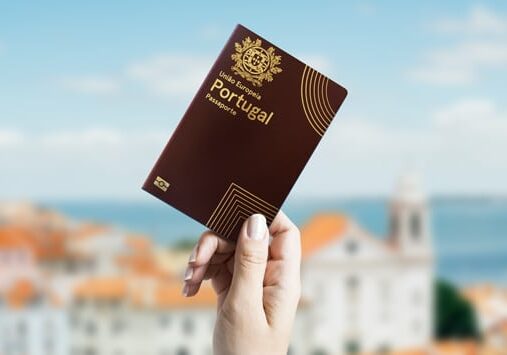
Understanding how to acquire Portuguese citizenship by descent can be complex, so we’ve created a detailed guide to help you do so.
This article covers everything from who is eligible to the documents you need. It’s a straightforward roadmap for those acquiring Portuguese citizenship by descent.
This expert-curated guide highlights:
What is Portuguese citizenship by descent?

Portuguese nationality law provides two pathways to citizenship: by origin (original assignment) and by acquisition.
- Nationality by origin is granted at birth, typically through descent from a Portuguese parent. Portugal applies the principle of jus sanguinis (“right of blood”), allowing citizenship to pass from a Portuguese parent to their child.
- Nationality by acquisition is granted later in life through naturalization or marriage.
Birth in the Portuguese territory (jus soli) may also confer Portuguese citizenship by birth in certain circumstances. Those who obtain citizenship at birth or through descent are considered Portuguese citizens of origin.
So, if you can prove that you have Portuguese parents or grandparents who are officially acknowledged as Portuguese citizens, you may be eligible to claim Portuguese citizenship by ancestry.
Benefits of Portuguese Citizenship by Descent
Visa-free travel within the EU: Portuguese citizenship allows you to live, work, and travel within the European Union.
Access to high-quality healthcare: You gain access to the country’s robust healthcare system, ensuring comprehensive medical services and well-being.
Educational opportunities: Portuguese citizens can enroll in the nation’s reputable educational institutions.
Cultural connection and sense of belonging: Portuguese citizenship establishes a cultural connection and enhances the sense of belonging.
Interconnected legacy: Portuguese citizenship acquired through descent often extends to future generations, creating a lasting familial legacy.
High quality of life: Portugal is renowned for its high standard of living and good quality of life, adding to the benefits of citizenship by descent.
Criteria for Portugal Citizenship by Descent
Portuguese law outlines clear criteria for claiming citizenship by descent through parents or grandparents in your family tree:
Child of a Portuguese parent

If the Portuguese parent was serving the Portuguese State abroad (e.g., as a diplomat or military personnel), citizenship is automatic.
Otherwise, the child’s birth must be registered with Portuguese civil authorities, or the child must declare the wish to be Portuguese. There is no age limit, as an adult child can register later to claim citizenship by origin.
Grandchild of a Portuguese citizen
If you have at least one Portuguese grandparent, you can apply for citizenship by descent, provided the grandparent did not lose their nationality. You must:
- Declare your intention to be Portuguese.
- Demonstrate an effective connection to the Portuguese community.
- Register your birth in the Portuguese civil registry.
There is no age restriction for grandchildren applying, but establishing a connection to Portugal is essential. Great-grandchildren are generally not directly eligible unless their parent or grandparent obtains Portuguese citizenship first. Citizenship must be recognized generation by generation, meaning that it can’t skip a generation.
Portuguese citizenship for Sephardic Jews
The Portuguese government allows for citizenship through Sephardic Jewish descent, but the process can be complex. Sephardic Jewish ancestry is that of those who descended from the traditional Jewish communities of the Iberian Peninsula (modern Portugal and Spain). The law applies not only to people who currently practice Judaism but also to those who can prove a traditional Sephardic cultural connection, such as having a family history of using the Ladino language and having Sephardic Jewish ancestry in their family tree. An immigration lawyer can help you gather a certified copy of death certificates, proving the succession line, and complete the application form.
Proving Effective Ties to Portugal

- Portuguese language proficiency: Showing the ability to speak and understand Portuguese.
- Cultural and community involvement: Participation in Portuguese cultural associations, frequent visits to Portugal, or engagement in Portuguese traditions.
While cultural involvement helps, language proficiency is the primary legal requirement for demonstrating effective ties. The following documents serve as acceptable evidence:
- Certificate of proficiency obtained from a Portuguese private school or public school.
- Certificate of proficiency issued by the Portuguese Consulate during residency abroad, provided the Portuguese proficiency exam was taken through the Center of Evaluation of
- Portuguese Language (CIPLE) in Portugal or in other designated exam centers worldwide.
- Certification of proficiency in Standard European Portuguese as a second language from any authorized Portuguese Evaluation Centre.
- Diploma conferred by a recognized Portuguese public or private educational institution.
- Submission of the school diploma suffices for graduates of public or private schools in Portuguese-speaking countries.
- In cases where literacy isn’t attained, alternative proof demonstrating proficiency in Portuguese is accepted.
How to Apply for Portuguese Citizenship by Descent

Applications can be made at the Institute of Registries and Notaries in Lisbon or Porto, online with a legal representative, or in person at the Civil Registry or Portuguese Consulate.
The first step is to gather documentation proving your lineage, such as birth, death, and marriage certificates. The process may vary slightly based on whether you are applying through parents or grandparents.
Requirements Documents for Portugal's Citizenship by Descent
Below is a comprehensive list of the documents that you’ll generally need to apply for Portuguese citizenship by descent:
- Official application form
- Birth certificate, which must include the names of both your parents.
- Copy of Portuguese parent or grandparent identity document
- Certified copy of the grandparents’ marriage certificate
- A copy of your valid passport or ID
- A criminal record check will be conducted.
- Proof of affairs or ties with Portugal
The required documents may vary depending on the specific circumstances of your lineage.
You must ensure that all your documents are properly certified and officially translated into Portuguese and legalized beforehand, either with the Apostille of the Hague Convention or by the Portuguese Consulate and Ministry of Foreign Affairs in the country where the document was issued.
How to Get a Portuguese Passport

Here’s a step-by-step guide to help you through the process of obtaining a Portuguese passport:
- Eligibility: Ensure you have your Portuguese Citizenship Card as proof of your Portuguese citizenship.
- Schedule appointment: Book an appointment at the nearest Portuguese Embassy or local Portuguese Consulate in your country of residence or AIMA if you’re in Portugal.
- Prepare documents: Gather all the necessary documents, including your Portuguese Citizen Card, proof of payment for passport fees, and a completed passport application form.
- Attend appointment: Attend the appointment in person as you may also need to have biometric data (like fingerprints) taken.
- Pay fees: Pay the required application fee for the passport application. Generally, you can pay by debit or credit card, though some consulates accept a money order.
- Collection or delivery: After your application is processed and approved, you’ll receive your Portuguese passport.
The Portuguese passport needs to be renewed every five years for adults and every two years for children under the age of five. Always check the expiry date and start the renewal process well in advance of any planned travel.
Portuguese Nationality Processing Time and Cost
Processing Portuguese citizenship applications can take up to a few months for the children of Portuguese parents and a couple of years in other circumstances. This duration is due to the multiple checks and processes involved in verifying and confirming all the information provided.
The fee for Portuguese citizenship applications is typically between €175 to €200. Generally, your payment options are a debit card, Portuguese bank checks, or a postal order.
Acquire Portuguese Citizenship: Entities That Can Help
There are several organizations and entities that are involved in the process or can be utilized to find the documentation required to prove your ties to Portugal and obtain Portuguese citizenship:
- Conservatória dos Registos Centrais – The Portuguese central registry office where applications for Portuguese citizenship are processed.
- Portuguese Embassy and Consulates—These are International offices where application documents are acquired and submitted outside Portugal. If you need to make an appointment, check with your local consulate.
- Instituto dos Registos e do Notariado (IRN) – Portuguese government agency responsible for registering and notarizing civil, property, commercial, and vehicle records, ensuring legal documentation and public trust.
- Serviço de Estrangeiros e Fronteiras (SEF) – This organization has been replaced by The Agency for Migration and Asylum (AIMA), which is now responsible for managing immigration, asylum, and border control.
- Portuguese Civil Registry Offices – District offices where births, deaths, and marriages are officially documented and registered. This is where you’ll find documentation for family ties to Portugal.
Why choose Global Citizen Solutions for your Immigration Visa?
GLOBAL APPROACH BY LOCAL EXPERTS
- GCS has offices located across Portugal.
- Members of the US-Portugal and UK-Portugal Chambers of Commerce in Portugal, and the Investment Migration Council (IMC).
- Our expert team can help you throughout your journey to secure your Visa.
100% APPROVAL RATE
- Our successful track record in applications provides reassurance to applicants.
- We have helped clients from more than 35 countries secure residency in Portugal.
ALL-ENCOMPASSING SOLUTION
- With a single channel of communication, our approach ensures that you have complete clarity on your application.
- Our BeGlobal® Onboarding System allows for a total flow of information.
TRANSPARENCY AND PRIVACY
- Our pricing is clear and detailed, you will not face any hidden costs.
- All data is stored within a GDPR-compliant database on a secure SSL-encrypted server.

Frequently Asked Questions about Portugal Citizenship by Descent
Can I pass Portuguese citizenship to my children?
As a Portuguese citizen, you can pass your citizenship to your children under certain conditions. Portuguese nationality law allows for the transmission of citizenship based on where the child is born and the parents’ circumstances.
How do I apply for Portuguese citizenship by descent?
Portuguese citizenship by descent requires being the child or grandchild of a Portuguese citizen, including those from former colonies and expelled Jews. It’s advisable to work with an immigration lawyer for the Portuguese citizenship application process.
Can I get Portuguese citizenship through my grandparents?
Yes, Portuguese citizenship through descent can be acquired through your grandparents. If at least one of your grandparents is or was a Portuguese national who did not lose their nationality, you can be granted Portuguese citizenship.
Can I get Portuguese citizenship through my great grandparents?
Descending from a great-grandparent is typically too far back for direct Portuguese citizenship. However, if your parent or grandparent obtains citizenship through them, citizenship by descent for grandchildren may be possible.
Is it easy to get Portuguese citizenship by descent?
The ease of acquiring Portuguese citizenship by descent can vary depending on your specific circumstances, such as the availability of necessary documentation and your personal connection to the Portuguese community.
Can I apply for Portuguese citizenship by descent if my ancestor was born in a former Portuguese colony?
Yes, you can apply for Portuguese citizenship by descent if your ancestor was born in a former Portuguese colony, as these territories were once part of Portugal. Citizenship by descent laws may apply, but you may need to provide additional documentation proving your ancestor’s connection to these Portuguese territories.
How does Portugal's citizenship by descent process compare to other EU countries?
Portugal’s citizenship by descent process is relatively straightforward for those with strong ties to the country, including through Portuguese territories or former colonies. Unlike some EU countries, Portugal may have more lenient residency or citizenship test requirements, especially for those from Portuguese-speaking countries.
How do I authenticate foreign documents for Portuguese citizenship by descent?
To authenticate foreign documents for your Portuguese citizenship by descent application, you’ll need to follow specific steps. Typically, documents must be notarized, translated into Portuguese, and then apostilled or legalized, depending on the foreign nation of origin.
Can I expedite my Portuguese citizenship by descent application?
While it’s challenging to expedite a Portuguese citizenship application, working with an immigration lawyer may help streamline the process.
Are there special provisions for Sephardic Jews in Portugal's citizenship by descent law?
Yes, Portugal has special provisions for those with Sephardic Jewish ancestry. Applicants can obtain Portuguese citizenship by descent if they can prove their lineage and connection to Sephardic Jewish communities expelled from Portugal during the Inquisition.
Can my children become citizens of Portugal as well?
Yes, your children can obtain Portuguese nationality. Once you have obtained Portuguese citizenship, your children are also eligible to apply. As children of a Portuguese citizen, they have the right to apply for citizenship by descent.
Can siblings of Portuguese citizens apply for citizenship by descent?
Yes, siblings of Portuguese citizens can apply for citizenship by descent if they meet the eligibility criteria. Each sibling must submit a separate citizenship application, which may be processed at the same Portuguese consulate.
Can I apply for Portuguese citizenship by descent if my ancestor was naturalized in another country?
Yes, but if your ancestor renounced their Portuguese nationality when naturalizing in another country, it could complicate the process.
Are there any residency requirements for Portuguese citizenship by descent?
No, there are no residency requirements for obtaining citizenship by descent. Applicants can complete the process from abroad, often through a Portuguese consulate, without needing to reside in Portugal.
What are the documents required for Portuguese citizenship by descent application?
To apply for Portuguese citizenship, provide:
- an original or certified copy of your birth certificate
- copy of your passport or another valid ID (not necessary for children under 14)
- birth certificate of the Portuguese parent and,
- if applicable, the marriage certificate of your parents.
If you don’t have these documents, provide the full name and date of birth of the Portuguese parent(s) for the Embassy or Consulate to locate their birth certificate. Also, include proof of address.
What's the processing time for Portuguese citizenship by descent?
The processing time for Portuguese citizenship through descent generally takes at least 24 months.
What's the cost of applying for Portuguese citizenship by descent?
The fee for Portuguese citizenship applications is typically between €175 to €200. This fee is non-refundable, regardless of whether or not your application is accepted.
Is knowing the Portuguese language required to get citizenship by descent?
To get citizenship through descent, you must have a close connection with the Portuguese community. This must be demonstrable through proficiency in the Portuguese language, residence, or consistent visits to the Portuguese territory.
Can I get a Portuguese passport with Portuguese citizenship through descent?
Yes, you can apply for a Portuguese passport after you become a Portuguese citizen. You’ll need to submit your citizenship certificate, a completed Portuguese passport application form, and a valid photo ID.
Can a US citizen get Portuguese citizenship?
Yes, a US citizen can obtain Portuguese citizenship through two main paths: citizenship by descent if they have Portuguese ancestry, or naturalization by meeting residency requirements and integrating into Portuguese society.
Can you hold dual citizenship in Portugal?
Yes, the Portuguese government does allow Portugal dual citizenship. This means foreign nationals can become Portuguese citizens and hold their existing citizenship simultaneously without renouncing their rights.


